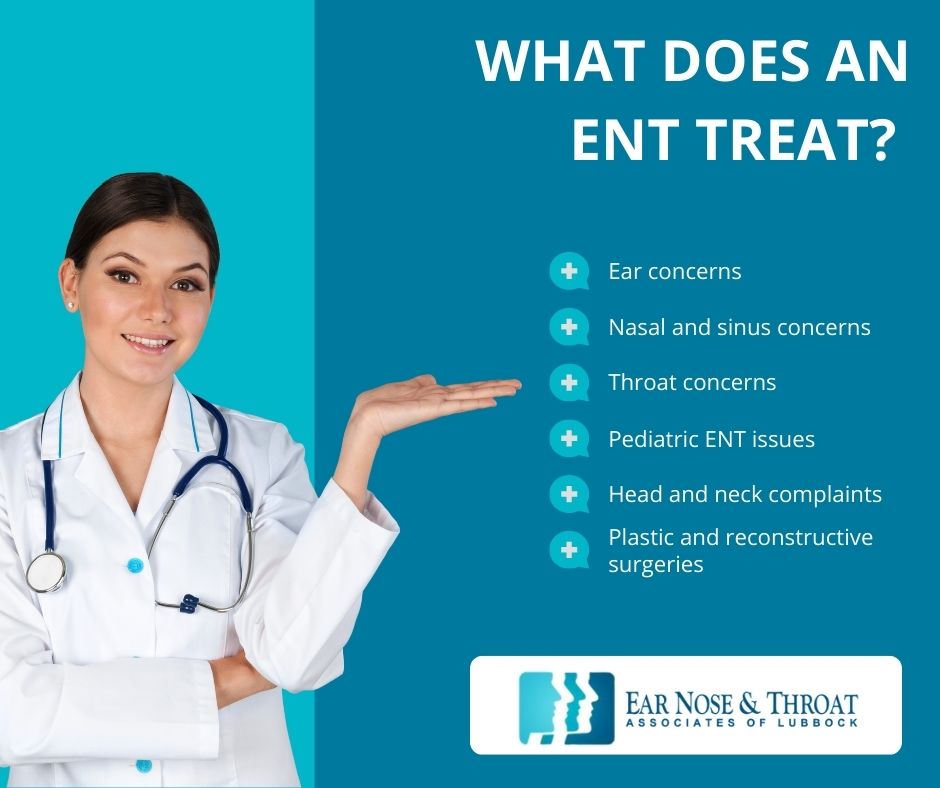What Is an ENT Doctor and When Should You See One?

The human body is made up of a vast network of interconnected systems, a complex machine capable of healing itself, growing new tissue, and fighting off disease. It’s so complicated and mysterious that despite studying it for generations, we still don’t know all there is to know about it.
This is why physicians cover different fields in medicine; there’s just so much to know. Some physicians are general practitioners, establishing long-term relationships with patients and monitoring their overall health for warning signs of deterioration or disease. Other physicians specialize in one body system or area, diving deep on the subject and giving it their full attention.
An ENT is one of these specialty doctors. But what is an ENT, what do they do, and when should you see one? We’ll break it down in this post.
What Is an ENT?
ENT stands for “ear, nose, and throat” and is the general term for an otolaryngologist. Otolaryngology is the branch of medicine that diagnoses and treats disorders of the head and neck.
ENT disorders involve the ears, nose, throat, or neck, and treatments for these conditions can be both medical and surgical in nature. This is why ENTs are known by yet another name: head and neck surgeons.
ENTs are highly trained, uniquely qualified doctors who intimately understand the network of passages between your ears, nose, and throat and the conditions that affect them.
What Is an ENT’s Specialty and What Do They Treat?
Some people only think of ENTs as treating severe allergies. Which they do! But they treat many other conditions, too, some common and some not so common. ENTs treat patients of all ages, from newborns to seniors, and assist with a huge variety of issues, which we’ll look at by category below.
Ear concerns:
- Ear infections
- Swimmer’s ear
- Ear pain
- Ringing in the ears (tinnitus)
- Hearing loss
- Dizziness and balance issues
Nasal and sinus concerns:
- Allergies
- Rhinitis
- Sinus infection (sinusitis)
- Postnasal drip
- Chronic runny nose
- Chronic nasal congestion
- Nasal polyps
- Deviated septum
- Nasal fractures
- Sinus headaches
- Certain tumors
Throat concerns:
- Infections
- Persistent sore throat
- Gastroesophageal reflux disease (GERD)
- Hoarseness
- Airway disorders like sleep apnea
- Salivary stones
- Tumors, such as salivary gland tumors
Pediatric ENT issues:
- Childhood asthma
- Recurrent ear infections
- Chronic tonsillitis
- Allergies
- Congenital deformities
Head and neck complaints:
- Masses on the neck
- Thyroid enlargement
- Thyroid nodules
- Thyroid cancer
- Parathyroid disease
Plastic and reconstructive surgeries:
- Cleft lips
- Cleft palates
- Ear deformities
- Reconstruction

How Does ENT Care Fit in With Regular Medical Care?
Typically, you see your general practitioner at least once a year to monitor your health and pick up on any new problems. Because ENT doctors are specialists, you won’t necessarily see one unless you develop an ENT issue.
Sometimes people see an ENT because their primary care doctor notices an ear, nose, throat, or neck issue, and they know to refer the patient to an ENT for further investigation and specialized treatment. Other times, patients notice ear, nose, throat, or neck issues themselves and seek out ENT care directly.
Once you establish a relationship with an ENT, they’ll determine how often you need to come in based on your unique situation. Everyone is different, so this varies greatly from person to person and condition to condition, unlike yearly primary care appointments.
When Should You See an ENT?
As you saw above, many conditions and ailments can warrant ENT care, but you may not know whether you have one of those conditions yet. So how do you know when to visit an ENT?
It really just boils down to uncertainty. If you notice any irregularities or have any concerns regarding your head and neck area, it’s always a good idea to see an ENT specialist.
Being proactive about even minor issues can make a positive difference in your health. Plus, getting a specialist’s insight can provide the intangible but valuable benefit of peace of mind. Keep in mind, though, that certain conditions may require initial evaluation by your primary care physician, who can then give you an ENT referral.
What Is an ENT Visit Like?
What is an ENT visit like, and what should you expect? At your first appointment, you’ll provide all the typical doctor’s appointment information, like insurance, medical history, medications you’re taking, etc. In the exam room, the doctor will ask about your symptoms, and then examine the relevant area.
Our office has in-house equipment so that, if necessary, we can immediately perform additional tests, like CT scans, eardrum mobility testing, and more. We can also perform certain procedures immediately in the office if needed, such as ear tube placement.
ENT appointments usually last 30-60 minutes, though additional testing may take longer. Once your doctor reaches a diagnosis,they will discuss treatment options with you. In many cases, treatment can be completed in a single office visit. However, some conditions may require ongoing care or even surgery.
The Final Word: What Is an ENT?
So, what is an ENT? An ENT is a physician who cares for people by diagnosing and treating their ears, noses, throats, and necks. They address seemingly minor issues like tonsillitis, postnasal drip, and sinus infections, which can improve a patient’s quality of life. They also take care of more serious issues like sleep apnea and various head and neck cancers, which can increase a patient’s length of life.
ENTs play an important role in healthcare. If you’re experiencing unpleasant or concerning symptoms in your ears, nose, throat, or neck, don’t be afraid to contact an ENT office today. That’s why we’re here!
Dr. Scolaro is a board-certified Otolaryngologist servicing the South Plains area. He has been practicing in Lubbock since 1990 and has earned a reputation as a skilled and experienced surgeon. He currently serves as the Medical Director for Covenant High Plains Surgery Center campuses, is a member of Covenant Health Partners and is an adjunct faculty professor for Texas Tech University Health Sciences Center School of Medicine. Learn more about Dr. Scolaro.
Categories:








